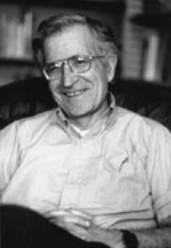

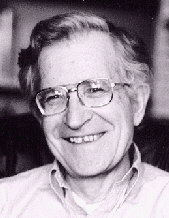
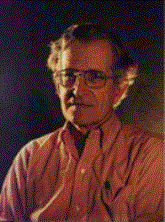
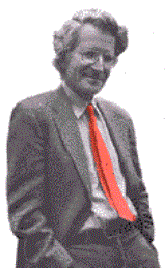
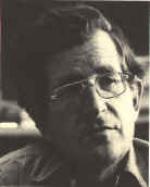
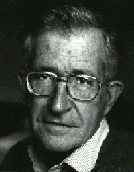
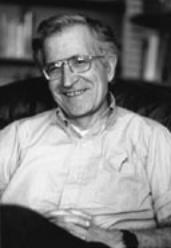

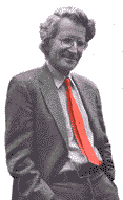
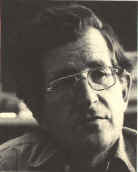
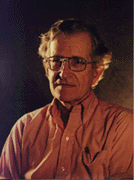
Noam Chomsky was born December 7, 1928, in Philadelphia, Pennsylvania, the son of William Chomsky, an emigrant from Russia. His father was a teacher of Hebrew and published a scholarly edition of a medieval Hebrew grammar. Between 1940 (age 12) and1945 (age 17 ) he became acquainted with the workings of the socialist-anarchist New York City Jewish intellectual community and considered emigrating to Israel to work for Arab-Jewish cooperation.
He received his early education at Oak Lane Country Day School and Central High School, Philadelphia. He continued his education at the University of Pennsylvania where he studied linguistics, mathematics, and philosophy. As a student, Noam was heavily influenced by Zellig Harris, who was Professor of Linguistics at the University of Pennsylvania. It was Chomsky’s sympathy to Harris’s political views that steered him toward work as a graduate student in linguistics. During this time, he proofread Zellig Harris’s Methods in Structural Linguistics and developed sympathy for Harris’s ideas on politics. He was also a student of Nelson Goodman, the radical-empiricist philosopher.
In 1955, he received his Ph. D. from the University of Pennsylvania; however, most of the research leading to this degree was done at Harvard between 1951 and 1955. In 1951, he accepted nomination by Goodman as a Junior Fellow to Harvard University. Chomsky has made his reputation in linguistics. He learned some of the historical principles of linguistics from his father, William, who was a Hebrew scholar. In fact, some of his early research, which he did for his Masters, was on the modern spoken Hebrew language. Among his many accomplishments, he is most famous for his work on generative grammar, which developed from his interest in modern logic and mathematical foundations. As a result, he applied it to the description of natural languages.
In 1953, Chomsky traveled to Europe. In Europe, he resolved that his attempt to formalize structural linguistics would not work because language was a highly abstract generative phenomenon, and determined that his further work should concern models of this phenomenon. He considers only one narrow aspect of human language, syntax. The early days of computing programs in the late '50s focused on translating one natural language into another and was seen as a potential solution to the "worldwide translation problem". This is when scientists came to understand that there is more to language than meets the eye.
During the year of 1955, he left his fellowship at Harvard and obtained a position at MIT where he taught for the next 19 years. He was also married to Carol Schatz, a Professor at Harvard, on December 24, 1949 and has two children.
Chomsky is very respected and has been honored numerous times in the academic arena. He has been awarded an Honorary Doctorate by the University of London and the University of Chicago, as well as having been invited to lecture all over the world. In 1967, he delivered the Beckman Lectures at the University of California at Berkeley. In 1969, he presented the John Locke Lectures at the University of Oxford and Sherman Memorial Lectures at the University of London.
Noam has always been interested in politics, and it is said that politics has brought him into the linguistics field. His political tendencies toward socialism and anarchism are a result of what he calls "the radical Jewish community in New York." Since 1965 he has become one of the leading critics of U.S. foreign policy. Between 1965 and1973, he played a major role in it. He published a book of essays called American Power and the New Mandarins which is considered to be one of the most substantial arguments ever against American involvement in Vietnam. He also published views on Southeast Asia and United States policy in magazines such as New York Review of Books and Ramparts and spent a week in North Vietnam just before Cambodian invasion.
He is currently a prominent American linguist at Massachusetts Institute of Technology and a political activist.
SOME RECENT PUBLICATIONS
-Barriers. Linguistic Inquiry Monograph 13, Cambridge: MIT Press, 1986.
-Knowledge of Language: Its Nature, Origin, and Use. New York: Praeger Publishers, 1986.
-Language and Problems of Knowledge: The Managua Lectures, Cambridge: MIT Press, 1987.
-Language in a Psychological Setting. Sophia Linguistica Working Papers in Linguistics, No. 22, Sophia University, Tokyo, 1987.
-Generative Grammar: Its Basis, Development and Prospects. Studies in English Linguistics and Literature, Special Issue, Kyoto University of Foreign Studies, 1988.
-"Some Notes on Economy of Derivation and Representation." In I. Laka and A. Mahajan (eds) Functional Heads and Clause Structure. MIT Working Papers in Linguistics, 10, 43-74, 1989.
-Reprinted in Robert Freidin (ed) Principles and Parameters in Comparative Grammar, Current Studies in Linguistics Series No. 20, 417-454, Cambridge: MIT Press, 1991.
-"On the Nature, Use and Acquisition of Language." W. Lycan (ed) Mind and Cognition: A Reader, 627-646, Oxford: Blackwell, 1990.
-"Linguistics and Adjacent Fields: A Personal View." In A. Kasher (ed) The Chomskyan Turn. 3-25, Oxford and Cambridge, MA: Basil Blackwell, 1991.
-"Linguistics and Cognitive Science: Problems and Mysteries." In A. Kasher (ed) The Chomskyan Turn. 26-53, Oxford and Cambridge, MA: Basil Blackwell, 1991.
-"Explaining Language Use." Philosophical Topics, 20(1), Spring 1992.
-"Language and Interpretation: Philosophical Reflections and Empirical Inquiry." In John Earman (ed) Inference, Explanation, and Other Philosophical Frustrations: Essays in the Philosophy of Science. Berkeley: University of California Press, 1992.
-"A Minimalist Program for Linguistic Theory." In K. Hale and S.J. Keyser (eds) The View from Building 20: Essays in Linguistics in Honor of Sylvain Bromberger. 1-52, Cambridge MA: MIT Press, 1993.
-Language and Thought. Wakefield, RI: Moyer Bell, 1993.
-(with Howard Lasnik) "The Theory of Principles and Parameters." In J. Jacbos, A. von Stechow, W. Sternefeld and T. Vennemann (eds) Syntax: An International Handbook of Contemporary Research. 506-569, Berline and New York: Walter de Gruyter, 1993.
-"Bare Phrase Structure." Cambridge: MITWPL, January 1994. Reprinted in Otero Festschrift. Georgetown University Press (in press).
-"Naturalism and Dualism in the Study of Language and Mind." International Journal of Philosophical Studies, 2, September 1994 (in press).
Related Web site: http://www.synaptic.bc.ca/ejournal/chomsky.htm
http://www.zmag.org/chomsky/index.cfm